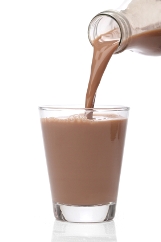As a sports dietitian, I rely on the research of exercise physiologists and sports scientists who study the best ways for competitive athletes to fuel their bodies to optimize their performance. John Ivy PhD, Professor Emeritus at the University of Texas-Austin and author of Nutrient Timing, is one such researcher. Here are some of his insights.
- Endurance athletes need three times more carbs than protein to optimally fuel their muscles. If you are on a high protein (or high fat) diet, you could easily be missing that goal. Poorly fueled muscles have a higher risk of becoming damaged during exercise.
- Eating every 2-3 hours is best. Let's say you are an Ironman triathlete who is training hard day after day. To optimally fuel your muscles on a daily basis, research indicates you want to consume at least 2.5-3.5 grams carbohydrate/lb. (6-8 g/kg) body weight/day, spread evenly throughout the day. That means carb-rich grains, fruits & veggies every 2-3 hours. This naturally happens if you eat breakfast, morning snack, lunch, afternoon snack, dinner, and evening snack.
- Consuming carbohydrate
stimulates the release of insulin. Insulin regulates the amount of glucose
(sugar) in blood and allows the blood glucose to get into muscles to fuel
muscles and replenish depleted muscle glycogen. Insulin also blocks the breakdown
of muscle. (That's why people, before being diagnosed with Type I diabetes,
experience a lot of m
 uscle loss.)
uscle loss.) - Protein combined with carbs stimulates a higher insulin response than eating just carbohydrate alone. This means, after you exercise, recovering with chocolate milk will replace glycogen more efficiently and better refuel your depleted muscles than if you were to have a Gatorade.
- Fueling at half-time offers an energy advantage. Soccer or football players would be wise to consume a carb-protein beverage, as tolerated, during half-time. Toss a few 8-ounce lowfat chocolate milk boxes into your gym bag?
- After an exhausting workout, a 155-lb (70 kg) athlete should consume about 450 calories of recovery food. The ideal target is 25-30 grams protein + ~85 grams carb as soon as tolerable. (More precisely 0.2 g protein + 0.6 g carb/lb. (0.4 g P + 1.2 g C/kg) body weight.) This could be a fruit smoothie (8 ounces of Greek yogurt + banana + berries) or 1 cup of cottage cheese + ½ cup granola + canned peaches. Food labels can help you figure out winning combinations of foods. (Don't get obsessed about the exact ratio; pay more attention to the concept of consuming more calories from carbs than from protein.)
- To get the most out of your weight-lifting program, you want to surround your workout with food. In a 13-week training program, one group consumed carbs + protein before and after the workout, while another group ate the same food but at the start and end of the day. The group that ate food close to their workout had a better training response and at the end of the 13-week training period, they were able to lift heavier weights (bench press, squat, dead lift).
- Choose carbs plus protein after hard exercise. By choosing both carbs+ protein (oatmeal + eggs, or pasta + meat sauce), you will be able to exercise better 24 and 48 hours after hard muscle-damaging exercise. You'll have a lower blood level of creatine kinase (CK), a marker of muscle damage.
- Post-exercise protein activates mTOR, an enzyme that turns on muscle-building pathways. While protein helps build muscles, carbs refuel muscles; so again, you want to eat some sort of carb-protein combination at meals and snacks. Doing so helps sustain a rapid rate of recovery for 8 hours.
- About 20 grams of post-exercise protein is optimal to stimulate muscle growth. It's more protein than many morning-exercisers might consume. For example, if you generally eat just a bowl of oatmeal after your morning workout, your might want to cook the oatmeal in milk and add two hardboiled eggs to the meal. Or if you have just a salad after a lunchtime run, top it with tuna fish.
- A before-bed snack helps muscle growth. At night, growth hormone peaks between 10:00 PM and 2:00 AM (the same time kids have growth spurts). You want to take advantage of elevated growth hormone by providing your muscles with the tools they need to grow. This means, before bed, eat a snack with protein, such as cottage cheese, turkey roll-ups, or 3-4 ounces of leftover chicken. (But please, don't even think about getting up in the middle of the night to eat. Sleep is more important!)
- A bedtime snack helps maintain blood glucose levels. In the early hours of the morning (4:00 AM) when blood glucose is sinking, another hormone, cortisol, triggers muscles to break down into amino acids (the building blocks of protein). These amino acids then get converted into glucose by the liver and normalize blood glucose levels so the brain has fuel to function. A bedtime snack can help maintain normal blood glucose levels overnight.
- Don't exercise on empty
in the morning; you want to break the fast! When you awaken in the morning,
your cortisol levels are elevated and breaking down muscle. If you eat nothing
before your morning workout, and/or skip breakfast afterwards, you stay in a
catabolic (muscle-loss) state. Bad idea! A pre-workout snack, such as a banana,
granola bar or swig of orange juice can switch your body from being in the muscle
breakdown mode to the muscle-building mode. (Note: Elevated cortisol can also
lead to abdominal adiposity. Yikes?)

- Protein-pacing helps reduce muscle loss at you age. By the time the average (non-athletic) 20 year-old is age 70, he or she has lost about 40% of his/her muscle mass; the rate of decline is about 6% per decade. Muscle power starts to decline about age 30; strength at about age 40. By lifting weights, you can curb that loss; use it or lose it! To reduce muscle loss, do "protein pacing" - eating protein evenly throughout the day. This is preferable to having a big chunk of protein just at dinner.
The bottom line: Food works! To optimize your performance, 1) pay attention to what and when you eat and 2) choose carb-protein combinations, with more carbs than protein. A sports dietitian can help you create a winning food plan. Use the referral network at SCANdpg.org to find your local expert.
Sports nutritionist Nancy Clark MS RD CSSD is a longtime MomsTEAM nutrition expert with a private practice in the Boston-area

(Newton; 617-795-1875), where she helps both fitness exercisers and competitive athletes create winning food plans. Her best-selling Sports Nutrition Guidebook, and food guides for marathoners, cyclists and soccer are available at nancyclarkrd.com. For information about her online workshop with John Ivy, see www.NutritionSportsExerciseCEUs.com.








